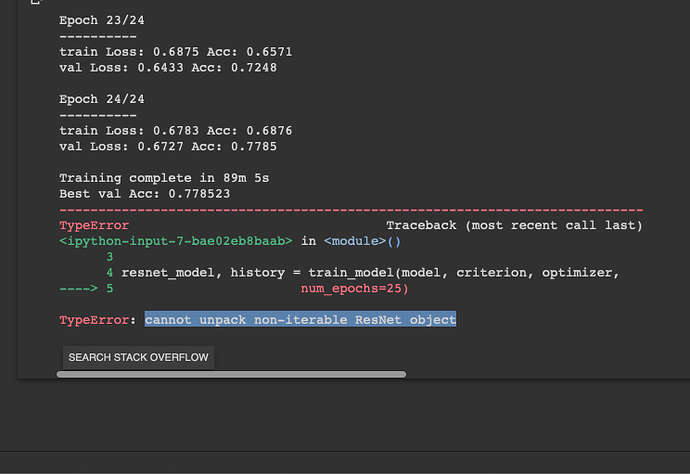Hi,
Im trying to make my first CNN using pyTorch and am following online help and code already people wrote. i am trying to reproduce their results. I’m using the Kaggle Dogs Breed Dataset for this and below is the error I get. The trainloader does not return my images and labels and any attempt to get them leads in an error:
Traceback (most recent call last):
File "E:\Program Files\JetBrains\PyCharm Community Edition 2018.2.4\helpers\pydev\pydevd.py", line 1664, in <module>
main()
File "E:\Program Files\JetBrains\PyCharm Community Edition 2018.2.4\helpers\pydev\pydevd.py", line 1658, in main
globals = debugger.run(setup['file'], None, None, is_module)
File "E:\Program Files\JetBrains\PyCharm Community Edition 2018.2.4\helpers\pydev\pydevd.py", line 1068, in run
pydev_imports.execfile(file, globals, locals) # execute the script
File "E:\Program Files\JetBrains\PyCharm Community Edition 2018.2.4\helpers\pydev\_pydev_imps\_pydev_execfile.py", line 18, in execfile
exec(compile(contents+"\n", file, 'exec'), glob, loc)
File "C:/Users/sbzfk/PycharmProjects/my_FCN_attempt/Kaggle_Dogs_Competition.py", line 85, in <module>
img, label = next(iter(train_loader))
File "C:\Users\sbzfk\AppData\Local\Programs\Python\Python37\lib\site-packages\torch\utils\data\dataloader.py", line 314, in __next__
batch = self.collate_fn([self.dataset[i] for i in indices])
File "C:\Users\sbzfk\AppData\Local\Programs\Python\Python37\lib\site-packages\torch\utils\data\dataloader.py", line 314, in <listcomp>
batch = self.collate_fn([self.dataset[i] for i in indices])
File "C:/Users/sbzfk/PycharmProjects/my_FCN_attempt/Kaggle_Dogs_Competition.py", line 42, in __getitem__
img = self.transform(img)
File "C:\Users\sbzfk\AppData\Local\Programs\Python\Python37\lib\site-packages\torchvision\transforms.py", line 34, in __call__
img = t(img)
File "C:\Users\sbzfk\AppData\Local\Programs\Python\Python37\lib\site-packages\torchvision\transforms.py", line 187, in __call__
w, h = img.size
TypeError: cannot unpack non-iterable int object
Below is my code:
class DogsDataset(Dataset):
def __init__(self, filenames, labels, root_dir, transform=None):
assert len(filenames) == len(labels) # if the two are not of equal length throw an error
self.filenames = filenames
self.labels = labels
self.root_dir = root_dir
self.transform = transform
def __len__(self):
return len(self.filenames)
def __getitem__(self, idx):
this_img = join(self.root_dir, 'train', self.filenames[idx]+'.jpg')
print(this_img)
img = io.imread(this_img)
label = self.labels[idx]
print(label)
if self.transform:
img = self.transform(img)
return [img, label]
batch_size = 64
device = torch.device("cuda" if torch.cuda.is_available() else "cpu")
dataset_root = expanduser(join('~', 'Documents', 'kaggle_dogs_dataset'))
# join will intelligently join directories irrespective of OS, and expanduser will
# replace with /home/ in linux or the username in Windows
csv_file = pd.read_csv(join(dataset_root, 'labels.csv')) # csv file has two columns, id which are filenames and breed which are labels
filenames = csv_file.id.values # convert that column to an array, id is the column name and values converty to numpy array
# le = LabelEncoder()
# labels = le.fit_transform(csv_file.breed) # this will just encode the names between 0 to models-1 , basically changing strings to integers
labels = csv_file.breed.values
filenames_train, filenames_eval, labels_train, labels_eval = train_test_split(filenames, labels,
test_size=0.1, stratify=labels) # this is an import from sklearn as the name implies, it randomly splits data into train and eval, 10% of it to test and rest train
data_transform = transforms.Compose([transforms.Scale(224),
transforms.CenterCrop(224),
transforms.ToTensor(),
transforms.Normalize((0.485, 0.456, 0.406), (0.229, 0.224, 0.225))])
dog_train = DogsDataset(filenames_train, labels_train, dataset_root, transform=data_transform)
train_loader = DataLoader(dog_train, batch_size, shuffle=True)
dog_eval = DogsDataset(filenames_eval, labels_eval, dataset_root, transform=data_transform)
eval_loader = DataLoader(dog_eval, batch_size, shuffle=True)
def im_show(axis, inp):
"""Denormalize and show"""
inp = inp.numpy().transpose((1, 2, 0))
mean = np.array([0.485, 0.456, 0.406])
std = np.array([0.229, 0.224, 0.225])
inp = std * inp + mean
axis.imshow(inp)
img, label = next(iter(train_loader))
print(img.size(), label.size())
fig = plt.figure(1, figsize=(16, 4))
grid = ImageGrid(fig, 111, nrows_ncols=(1, 4), axes_pad=0.05)
for i in range(img.size()[0]):
ax = grid[i]
im_show(ax, img[i])
